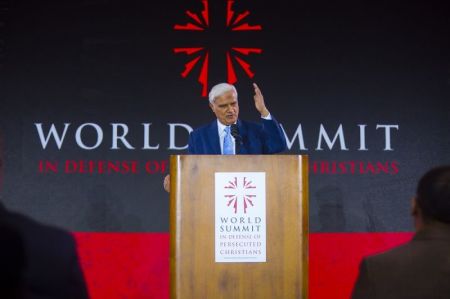Ravi Zacharias: Christians Must Reject 'Tepid' Christianity as 'Scorching Paganism' Rises in West

WASHINGTON — A renowned apologist is urging the Western Church to spurn comfortable Christianity and instead emulate the prophet Daniel, who made several key decisions to avoid becoming corrupted in a deeply evil society.
Ravi Zacharias noted on Friday at the World Summit in Defense of Persecuted Christians that his calling is to hostile audiences, often like those one finds on secular university campuses. Addressing victims of persecution and their advocates was a bit unusual for him, he said, even saying he felt it was "audacious."
But his calling and this particular subject and speech Friday presented an irony.
"Who would have ever thought that of all the nations in the world now I have to go with security on the campuses of the United States?" the apologist asked.
Zacharias said he received threatening letters from "strongly atheistic groups," noting that he recently spoke at an Ivy League school with body guards present. He even heard from a Christian friend in Jakarta, Indonesia, who wrote him that morning saying that he and fellow Christians would be praying for him.
"Things have changed," he noted, highlighting the challenges of the day which come "in many garbs because of the resistance to the absolute claims of the living God."
"They will mock you, they will ridicule you, they will try to throw division in the ranks, and when all else fails they will use force."
Such was the case for the prophet Nehemiah when he tried to build the wall, he said.
Yet the resistance to the claims of God is not new and cunning leaders have strategized to erase them. But over time those whom God has marked for His purposes have prevailed.
Zacharias mentioned the genius of Nebuchadnezzar, king of Babylonia in 605 BC, in choosing the brightest minds from among Israelite captives and how he effectively reprogrammed them in the language, literature, and philosophy of Babylonians.
"Language is what you communicate with, literature is what you illustrate with, philosophy is what you think with," he explained.
In taking those three disciplines and retraining their thinking in this way, Nebuchadnezzar influenced these minds through the back door of their popular imagination and not just through the front door of their reason.
To resist the opposition in culture today, the church of Jesus Christ must adopt the approach of Daniel, who although captive in Babylon was more shrewd than King Nebuchadnezzar. In refusing to eat the king's food, they were rejecting the comfortable life, he said.
Daniel was even more brilliant than Nebuchadnezzar, a man "who could see through the scam" and "look beyond the mist and understand exactly what was going on," Zacharias said, adding that Daniel made several decisions in his life that Christians today would do well to make.
"Number 1, [Daniel] drew his line of resistance by training his appetite," Zacharias said.
"We must train our hungers and our longings if we are going to be in this world and not of the world," he exhorted the attendees.
The West has become so "softened up," he added. While there was nothing wrong with the food at King Nebuchadnezzar's table, Daniel's refusal to partake reveals that he knew if he indulged he would forget his primary calling.
"And so he harnessed an arena of persecution and turned into a platform of opportunity, by resisting the temptation to be comfortable," Zacharias said.
"Ladies and gentlemen, we are living at a time where we had dare not set a tepid Christianity beside a scorching paganism," he said to great applause. "It is going to take men and women who are not only having integrity in the superfluous areas of life but deep in the very soul of their choices and commitments."
Even a spiritually blind person can see the power of a person who lives his or her life in this way, he said.
Daniel drew another line, one of dependence on God, such that he gained not just knowledge and understanding but wisdom, he said.
Zacharias said that he is a lover of books, but that he has "come to the realization that books can only take you so far."
The mind must be stirred, he said, "but the soul needs to be vibrant with the scriptures" because "that's where you really get wisdom from."
Zacharias told the audience that he frequently visits the Middle East and on one particular occasion years ago, he met with a leading Shiite cleric in Damascus, Syria.
After a period of back and forth questions and answers between him and the cleric, the cleric said to Zacharias: "Professor, I want to say something to you ... maybe it is time for us in the Islamic world to stop asking if Jesus died on the cross, and to start asking why."
Zacharias asked the cleric for permission to quote him; his name was Sheikh Hussain.
"Why did He die on the cross?" Zacharias asked the crowd. "Because we could not be saved by the wisdom of this world and the firepower of the flesh. It is only going to be salvation offered by our Savior who shed His blood so that we would not need to be shedding ours, and who fills us with the indwelling presence of the Holy Spirit to give us utterance when we need it most desperately."
"The Christian faith is the only faith that has a bleeding, bloody Savior as the centerpiece of the reason for its hope."
He concluded: "As torturous as the times may be, God will conquer not in spite of persecution. He will conquer through it as His name will be lifted up high as the blood of the martyrs gives rise to the next generation of young people who will see the courage and the strength of these men and women."





















